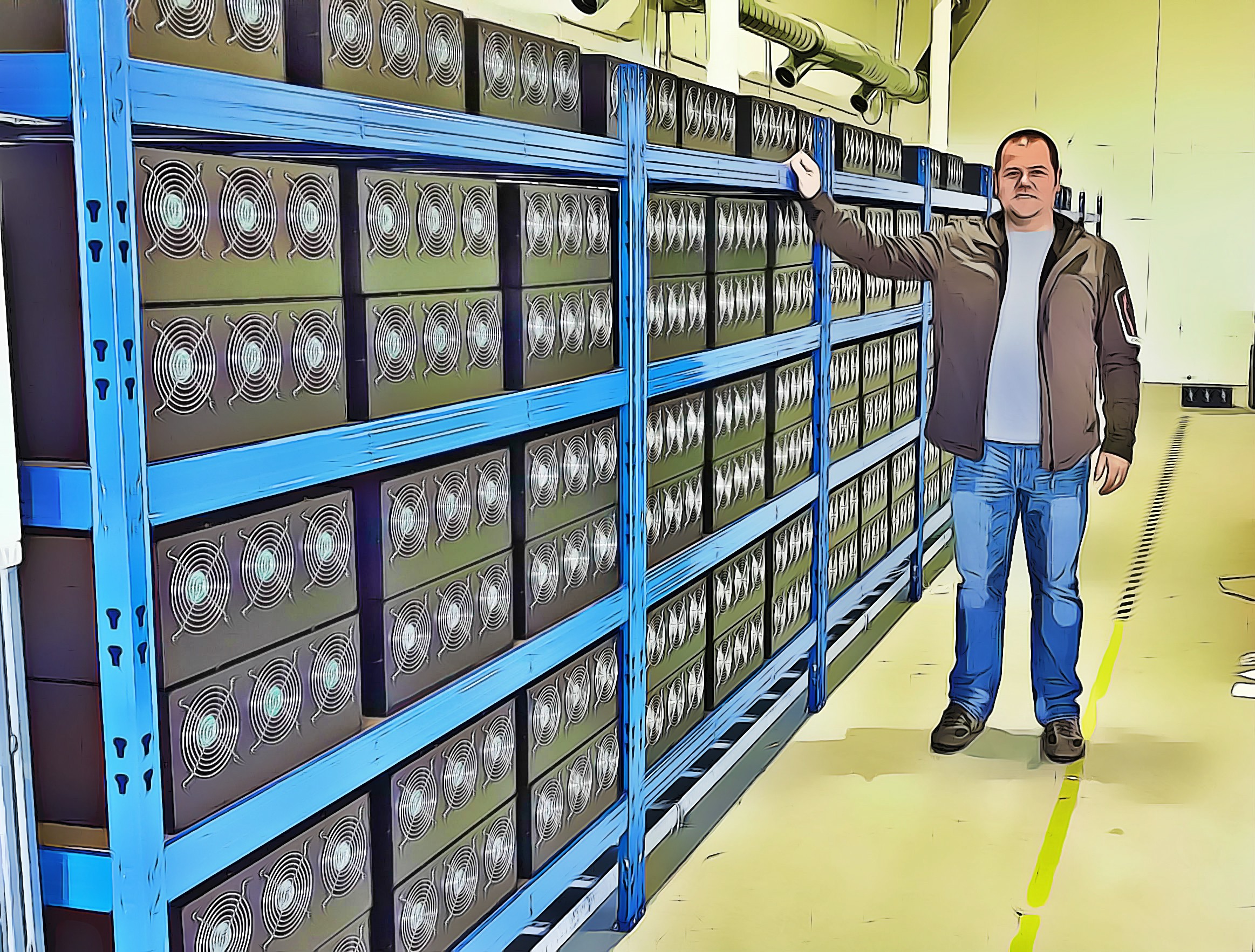Good News for Cryptos, Not so Good News for the Euro, EBZ, EU & More

Maverick German Economic Forecasters Matthias Weik & Marc Friedrich warn that 2018 will be the fateful year for the EU, the Euro and our monetary system. Spoiler alert, don't sell your Bitcoin yet.
Here is my translation, done specially for Steemit. This is an interesting, provocative, and thoroughly sobering year-end prognosis by a team of bestselling German authors. Due to the length I opted to create and translate a summary for you. If you are primarily interested in their take on cryptos, that section is near the end. They are self-described “Querdenker,” which they themselves translate as “lateral thinkers.” I would translate it as contrarians or mavericks, who think outside the box. They are also public speakers and financial advisers.

Zuerst wünsche ich euch allen ein frohes neues Jahr! Dieser Post ist eigentlich meine Übersetzung eines Artikels von den Crashpropheten Weik & Friedrich: “2018 wird das Schicksalsjahr für die EU, den Euro und unser Geldsystem.”
Ich bin davon ausgegangen, dass einige von euch den Artikel interessieren könnte – deshalb habe ich den „deutsch“ „tag“ verwendet. Als fast alle anderen Experten 2016 Hillary Clinton als Siegerin gesehen haben, haben sie eine Woche vor der Wahl nicht nur Donald Trump als Sieger prognostiziert, sondern gingen sie auch davon aus, dass sein Sieg einen Börsencrash im Jahr 2017 verhindern würde. Dies war natürlich das Gegenteil der üblichen Meinung, die behauptete, dass im unwahrscheinlichen Fall eines Trump-Sieges ein massiver Crash eintreten würde.
Sie haben auch die Geldpolitik der EZB ziemlich genau vorhergesagt. Daher dachte ich, dass ihre Prognose über den Euro, die EU und Kryptos einige von euch interessieren könnte. (Bitte schieß nicht auf den Messenger bzw den Übersetzer ;-) Ihr Ausblick auf die Zukunft ist eher ernüchternd, daher würde ich eure Einsichten begrüßen, nachdem ihr die Chance gehabt habt, ihre Prognose zu lesen.
Brief Description of their latest book
To give you an insight into their thinking, I've also translated a brief description of their latest bestselling book: “Capital Errors: How our prosperity is being destroyed and why we need new economic ideas.” (Released May 2016 , at this time only available in German.)
The 2008 financial crisis pushed the global economy to the brink of collapse, yet to date its causes have neither been understood nor resolved. Marc Friedrich and Matthias Weik show why capitalism repeatedly fails to distribute our enormous wealth fairly and sustainably. They examine why it periodically loses both the ability to innovate as well as the capacity to increase prosperity, the quality of life, and social security. Why at times only the interests of corporations, the super-rich, and financial elites matter – who themselves are almost completely isolated from the real economy.
Contrary to what their advocates maintain, unregulated financial markets do not ensure that capital reaches the best available outlets for the common good. If 0.1 percent of the world's population decides how 80 percent of global wealth is invested, that has nothing to do with free markets and competition. On the contrary, financial-capitalism is simply bad capitalism, because the distribution of existing wealth is totally inefficient. Friedrich & Weik explain in a generally understandable way how rational capitalism can actually work.
Previous Forecasts
On November 1, 2016 on German television Marc Friedrich correctly predicted that Donald Trump would win the presidency and a drop in the markets would thus be avoided. I think we all recall that the vast majority of media voices predicted a victory for Hillary Clinton, and in the unlikely event of a Trump win, a stock market crash.
A month later they predicted the EZB would extend its (their words) insane debt repurchasing program for another six to twelve months. For more see: https://fw-redner.de/lateral-thinkers/forecasts-met/
About The Article
Although it is published by Epoch Times, Weik & Friedrich write as guest authors whose opinions don't necessarily correspond to those of publisher. Link to the original German language article
It begins with this brief introduction from the publisher:
“It does not get better - but definitely more exciting, explain Matthias Weik & Marc Friedrich in their annual outlook for 2018. Germany finds itself without a real government and with out-of-touch political actors as it approaches the end of the Merkel era.”
Summary translated from the original German by yours truly
No matter whether Germany, Europe, Asia, USA, Africa or the European Central Bank (ECB) - it seems that the world has obviously gone crazy. More than ever before, international corporations are plundering countries, even whole continents, paying little tax, while the middle class is relentlessly squeezed.
They are playing with fire, printing money as the political elites exhibit an embarassing degree of cluelessness and incompetent which can't be exaggerated. In Germany, after months of closed door negoitations the nation is still without a government. On top of that, we are in the middle of the “Age of Industry 4.0” and digitalization, which our politicians, for the most part, completely underestimate or, worse still, refuse to accept. Being this out-of-touch with reality will soon result in bitter consequences...
Artificial intelligence has arrived in real life. Today, algorithms are already solving computer problems, they are looking for and finding tumors, they are an indispensable part of investment banking ... They continue to learn at unimaginable speed. No human can compete with that.
Almost everyone will be unemployed

The UN, the IMF and the WEF assume that in the future 40 to 75 percent of jobs will become obsolete. In particular, unskilled and low-skilled jobs will disappear on a large scale, but digitization will also affect higher-skilled jobs. Whether factory workers, service personnel, retailers, construction workers, bus, taxi drivers, office workers, lawyers, managers, bankers or investment bankers, doctors -- everywhere the machines are on the rise.
Why won't new jobs be created like in the past?
Because today new markets aren't being tapped, rather the existing markets are being optimized and made more efficient. In view of this, more than ever, politicians must now seriously consider what jobs the many unqualified immigrants, who often do not even speak German, will be able to perform in the future...
What will we do with the millions of people without work in the future? The consequences of digitization will surely exhaust our current social system. Consequently, it is now necessary to completely reevaluate this reality. In the future there will have to be a guaranteed basic income in Germany, but also in many other industrialized countries, because otherwise social upheavals can not be prevented.
German Old Economy - Obviously a bad deal for the big players from Silicon Valley
Today, the top 5 US companies (Apple, Microsoft, Alphabet, Cisco, Oracle) have amassed over $ 630 billion (€ 532 billion) in cash reserves. Apple alone with its cash reserves of nearly 270 billion dollars, could acquire companies such as Siemens (€ 97.7 billion), Volkswagen (€ 86.06 billion), Daimler (€ 74.49 billion), Allianz (€ 89.19 Billion), Bayer (€ 88.86) or BASF (€ 86.65 billion) from the petty cash. Why don't they don't do it? Because it's obviously a bad deal.
Apple or Google could easily acquire Deutsche Bank and Commerzbank. Both have had a full banking license for years. They don't they do it? Because it is "old economy." Because the old banks are not lucrative and, above all, do not look promising...
We all have to renew our thinking!
We call for the abolition of professional politicians and instead advocate for politicians and parties who aren't pigeonholed and bound by their respective ideologies, but instead act in the interests of people and the country, while keeping their fingers the pulse of the times...
Statistically, we are undoubtedly a rich country.
The wealth, however, is unfairly distributed. According to the Global Wealth Report of the Credit Suisse Research Institute, which analyzes global asset growth each year, the median value of the financial assets for adults is around $ 47,000 in Germany.
Even in crisis-hit Greece, it's $ 55,000. In the Netherlands it is $ 94,000, in Denmark $ 87,000 and in Belgium $ 168,000. Even in France it's $ 120,000 and even in Italy it's $ 125,000. Only Portugal is behind Germany with $ 38,000 in the old EU countries...

Retirement Income
The pension level in countries such as Portugal is 90 percent (pension/previous earning)
The pension level in Germany is 47.9 percent. In countries such as Croatia, the Netherlands, Portugal, Italy, Austria, are over 90 percent, in Hungary, Bulgaria, Luxembourg, Slovakia, Cyprus, Spain, Denmark more than 80 percent. The EU average is 70.6 percent. In all, 23 countries are ahead of Germany.
By 2030, in Germany the pension level will sink to 43 percent! So far no politician can explain how this should work, and in particular how someone will be able to live a dignified life in Germany.
Forecast for Germany for 2018
We expect a minority government because Berlin is too afraid of new elections and potentially even worse results.
The SPD is afraid of another grand coalition, which for them would mean certain death in the next elections.
Angela Merkel will depart in one or two years, perhaps at the time of the European elections, and pass the baton...

Planned EZB Economy to Continue
It is also expected that the ECB's planned economy will continue after September 2018 in order to keep the financial system alive. For us citizens that means the expropriation will continue.
Thanks to the insane central bank policy of the ECB, on the one hand real estate prices in urban centers will continue to rise in 2018 and housing will increasingly become a luxury. The Dax will continue to be driven upwards.
On the other hand, the public fees for us citizens as well as fees for accounts and other bank charges will continue to increase. Banks will close more branches, merge or settle.
The health insurance fees will continue to increase. In 15 years at the latest, our health care system will collapse due to skyrocketing costs and the ever-shrinking middle class.

The refugee crisis will continue to drive an ever larger wedge into society.
Africa: Migration will massively increase. All the while, Western corporations are plundering the continent unabated. If we do not stop this immediately and begin to give people in Africa a perspective and to pay people fairly there, then future migration will far exceed the current refugee flow from Africa.
Dr. Bruno Kahl, President of the Federal Intelligence Service, said: "It is highly questionable whether Western efforts to combat the causes of the exodus can even keep pace with this dynamic. Especially as a connection is often overlooked: even if it should succeed in improving the economic situation of individual African states, initially this will probably lead to even more migration. The reason is that even with very limited economic growth, many people will, for the first time, have the ability to finance the trip to Europe. Well over a billion people will have a rational reason for migration in the future.
Powder keg Middle East
The Middle East is developing more and more into the powder keg... Proxy wars between Saudi Arabia and Iran will increase and not limit themselves to Yemen.
The next wave of refugees will return to Europe , at the latest, when the conflict between the two regional powers escalates further. It is not a question of whether, but only when.
Welfare state or open borders?
The next question that Germany and Europe will face is the question of "welfare state" or "open borders".
Nobel laureate Milton Friedman stated 40 years ago that open borders and the welfare state are mutually exclusive. One must choose one or the other.
We assume that the borders will be closed in the future. Initial tendencies in this regard are already evident in Europe.
For example, Flensburg Mayor Simone Lange says this about the controls at the German-Danish border: "The current controls are similar to a permanent border control - and they are unlawful under EU law." Nevertheless, shortly before Christmas, the Danish parliament agreed to tighten controls at border crossings to Germany.
EU - planned economy of the ECB continues and the Euro will fail
We still do not see the situation in Europe as positive...
As we predicted a year ago, interest rates will remain at 0 and will remain there for a very long time, and prices will continue to rise.
Today, the inflation rate is 1.9 percent, and the International Monetary Fund (IMF) demands that German savers resign themselves to rising prices for longer periods despite zero interest rates.
To date, the insane ECB central bank policy has cost savers over 436 billion euros...
The ECB and the national central banks are resolutely trying to solve the crisis with the printing press. By the end of 2017, the ECB has created just under € 2.2 trillion out of thin air. Meanwhile, in terms of total assets, the ECB has overtaken even the US Federal Reserve (FED).
Never in the history of humanity has a crisis been solved sustainably with the central bank printing press.
Obviously, things are not going well in the eurozone, otherwise the asset acquisition program would have been long since stopped and the key interest rate would have increased considerably. But neither will happen in 2018. On top of that, Target 2 liabilities will continue to rise.
After reaching a record level of € 855 billion in 2017, in 2018 we will see new record levels. We will never see this money again and it can already be added today to the German national debt.
The Euro is a Grand Failure
Even today, the euro has failed terribly as the engine of integration. Of all people, economists from the ECB came to this conclusion in their study.
Contrary to the claims of the political class, Germany is not the big Euro-winner. Since the introduction of the Euro, German prosperity in relation to the entire EU has gone downhill. In 1998, GDP per capita in Germany was 125 percent of the average, at the end of 2016 only 123 percent.
The biggest losers in the Euro are Greece, followed by Italy, Portugal, Cyprus, France and Spain. The largest beneficiary is the low tax country Ireland, followed by Estonia, Slovakia, Lithuania and Latvia.
More than ever, it is becoming clear that the Euro is dividing Europe rather than uniting it, and as a result an end to the eurozone is foreseeable. We expect it to happen three to five years from now.
Spain - Catalonia will say goodbye
Spain is heading for immense problems. Although it is economically on the upswing, it's not enough. Industrial production is currently at the 1997 level. The debts of 2017 can not be paid for in this way...
Italy - EU and Euro critical forces continue to gain ground
In spring 2018 Italy will go to the polls. Our forecast: The EU and Euro skeptic parties will be very strong, and if we are unlucky, we will even see Silvio Berlusconi in power again...
Bitcoin – Don't Sell Now
Cheap money from central banks ensures rising prices -- Outlook for capital markets
After recommending bitcoin at 800 Euros last year, it has literally exploded since the beginning of 2017, surpassing our wildest expectations. For 2017, we had predicted a price target for Bitcoin of € 1,500 to € 2,000. The Bitcoin currently stands at over 12,000 euros (as of 29/12/2017).
Our multiply raised price targets for 2018 have already been reached! Nevertheless, we assume that the price, with corrections, will continue to increase.
We estimate the target for the Bitcoin 2018 at 20,000 to 30,000 euros. Should I sell now? Is it a bubble? We say no. Why?
It will continue to move upwards as far too few people have invested in cryptocurrencies and the initial barriers to acquiring crypto-currencies for non-tech people are still very complex. The potential is enormous. The big money of institutional investors will still flow into the crypto market.
Should you invest in Bitcoin and Co? We say yes. With between 1 and 5 percent take a speculative position.
2018 will be the year of decentralization for world politics, the financial world and the monetary system.
We will increasingly see separatist movements and parties that support them strengthening. Banks will suffer even more from zero interest rates and will consequently withdraw more and more. At the same time, decentralized monetary solutions will gain market share because more and more doubts arise about the omnipotence of central banks.
Short question to you: who do you trust more?
A central office with an elected and non-democratically elected president who can print an infinite amount of money (ECB), or a decentralized monetary system based on a mathematical algorithm and thus on a natural law?
On top of that, bitcoins are limited to 21 million units, unlike the Euro and all other currencies.
For the time being, 2018 will see capital markets continue to rise, thanks to the cheap money of the ECB. We believe that many stocks have been overheated, but thanks to the central banks, they will continue to rise. Nevertheless, we should not forget that we already have an 8-year bull market behind us.
More than ever, people are looking for safe havens for their portfolios.
Therefore, we assume a strong year for raw materials. Consequently, the gold and silver money metals will develop positively. We also see mining stocks as interesting and should outperform.
But cryptocurrencies such as Bitcoin, Ethereum, Iota, Cardano, Lisk, Substratum, Monero, Verge, etc. will continue to gain in appeal in 2018. There are plenty of reasons for this: Confidence in the markets, central banks and the money system itself are steadily waning - on a global scale.
The monetary system is in the endgame. Prepare yourself. Do it like our clients. Diversify your fortune...
The window of opportunity won't get bigger. We wish you good luck and all the best for 2018 - especially good health!
This article is only the opinion of the author. It does not necessarily reflect the opinion of the Epoch Times or the opinion of other authors of this site.
The actual article is considerably longer, but I think I've given you a solid summary of their overall forecast.
I'd love to hear your thoughts and predictions
FROHES NEUES JAHR -- HAPPY NEW YEAR!
Thanks for stopping by! You can visit my main page for more
Photos from pxhere.com free use non attribution with effects by @roused
Photo of server bank is a Google search free use photo with effects by @roused
Translation from the original German by @roused
You can visit the authors website: http://friedrich-weik.de/

Tolle Arbeit! Ich stimme nicht in allen Punkten mit den beiden überein, aber im Großen und Ganzen zeigen sie schon zutreffend auf, wohin die Reise führt. Trotzdem muss man feststellen, dass der große Crash bislang ausgeblieben ist und das System weiterzulaufen scheint, den Zentralbanken sei es gedankt (oder vorgeworfen).
Thanks!
In English people speak of the "beach ball" effect. They mean that the central banks have created bubbles in the stock market and manipulated the price of metals and commodities to keep them from rising.
But the metals will someday be like a "beach balls" that you hold underwater. Once the banks lose control, then the metals will shoots straight up in price.
They can't control the cryptos, so they are already behaving like "beach balls" :-)
I am amazed that the financial bubbles haven't popped, but as long as all the central banks continue, it's impossible to know when the end will come. What a mess ;-)
I read the original article in German - this is really a well thought-through analysis of the previous year and possible ways 2018 could take, makes lot of sense, thanks for sharing!
Glad you check it out! I agree, it was very thought out.
Awesome research!
DANKE für diesen Beitrag!
thanks for stopping by!
Hi,
thank for outlining these facts. I'm not 100% sure, if all the assumptions are going to happen. But the one forecast that Trump is going to win the election. Either Marc Friedrich is a genius or just good in betting. We will see. Let's see
Regarding the EURO forecast. I think that the great recession is over as economic data also show in the right direction and deliver positive signals
We'll see.
Amazing writing, hopefully I can visit Europe sometime.
Greetings from Aceh Indonesia
@hasnandaputra
Crypto lovers be like😍
oh sure, i agree with you..
i like your cryptocurrency research...
thnx for share this post
why people talk about bitcoin
#bitcoin
My head has a headache thinking about the bitcoin price now because its selling it